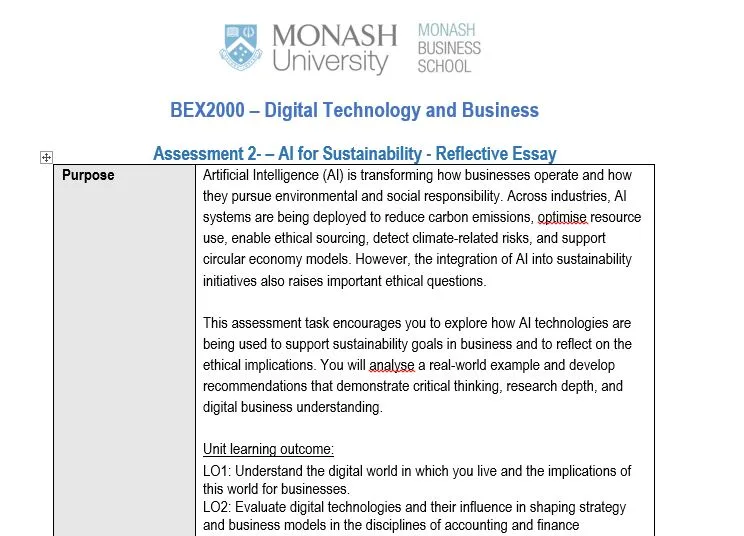BEX2000 Assessment 2 – AI for Sustainability – Reflective Essay
| Purpose | Artificial Intelligence (AI) is transforming how businesses operate and how they pursue environmental and social responsibility. Across industries, AI systems are being deployed to reduce carbon emissions, optimise resource use, enable ethical sourcing, detect climate-related risks, and support circular economy models. However, the integration of AI into sustainability initiatives also raises important ethical questions.
This assessment task encourages you to explore how AI technologies are being used to support sustainability goals in business and to reflect on the ethical implications. You will analyse a real-world example and develop recommendations that demonstrate critical thinking, research depth, and digital business understanding.
Unit learning outcome: LO1: Understand the digital world in which you live and the implications of this world for businesses. LO2: Evaluate digital technologies and their influence in shaping strategy and business models in the disciplines of accounting and finance LO3: Assess and evaluate how specific digital technologies (e.g. artificial intelligence, blockchain, cloud computing) shape key business processes and practices (e.g. planning and forecasting, fintech payments, regulatory compliance) LO4: Consider the ethical, moral and legal aspects of the greater use of digital technology in businesses and the impact on staff and partners along the business value chain. Competencies: ● Discipline knowledge and skills ● Critical thinking and problem solving ● Communication skills ● Research skills ● Digital and business strategy evaluation |
| Your Task | Write a Reflective Essay that evaluates the role of AI in advancing sustainability within a specific industry or business context, and its ethical implications. Focus on one AI technology (e.g. machine learning, computer vision, NLP, robotic automation) and one key sustainability issue (e.g. carbon reduction, energy efficiency, waste management, climate resilience, biodiversity protection). More details below. |
| Value | 40% of your total final marks |
| Word Limit | 1,200 words (maximum-hard limit)
Please see instructions below for more details. |
| Due Date | Friday 19 September 2025, Week 8, 23:55 AEST |
| Submission | Electronically via Moodle (Word document). Turnitin will be used for similarity checking of all submissions. |
| Assessment Criteria | Please refer to the marking rubric below. |
| Late Penalties | ● 5% deduction per calendar day or part thereof for up to one week
● Submissions more than 7 calendar days after the due date will receive a mark of zero (0) and no assessment feedback will be provided. |
| Special Consideration | For information on the special consideration application, please visit: http://www.monash.edu/exams/changes/special-consideration. |
| Feedback | Feedback will be provided via:
● general cohort performance ● individual student feedback by relevant faculty based on student requests |
| Conditions for use of generative AI | Generative AI tools can be used for brainstorming and initial research, but all final content must be original work. Any use of generative AI in the report must be clearly cited and explained as your Appendix 1.
Please refer to the University’s instructions on how to acknowledge the use of AI – https://www.monash.edu/student-academic-success/build-digital-capabilities/create-online/acknowledging-the-use-of-generative-artificial-intelligence |
Solution
Introduction
The waste production is unprecedentedly high because of active urbanisation and increasing consumption, and waste management is currently one of the most pressing issues in the sustainability development of the sphere. The availability of the traditional methods of waste-sorting makes recycling programs ineffective due to their high cost and inefficiency. Artificial intelligence (AI) has also greatly facilitated the identification and sorting of trash as now it is possible to sort garbage much better and more efficiently thanks to computer vision…
Understanding of AI & Sustainability Context
The computer vision sector of artificial intelligence, which employs algorithms trained on vast volumes of data, enables a robot to analyse and assess visual data (Matsuzaka and Yashiro, 2023). It is helpful in the waste management…
Purchase the entire solution for $15.00
